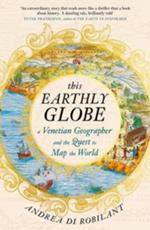During the age of discovery in the autumn of 1550, an anonymously authored volume containing a wealth of geographical information new to Europeans was published in Venice under the title Navigationi et Viaggi (Journeys and Navigations). This was closely followed by two further volumes that, when taken together, constituted the largest release of geographical data in history, and could well be considered the birth of modern geography.The editor of these volumes was a little-known public servant in the Venetian government, Giovambattista Ramusio. He gathered a vast array of both popular and closely guarded narratives, from the journals of Marco Polo to detailed reports from the Muslim scholar and diplomat Leo Africanus.In an enthralling narrative, Andrea di Robilant brings to life the man who used all his political skill, along with the help of conniving diplomats and spies, to democratise knowledge and show how the world was much larger than anyone previously imagined.

This earthly globe : a Venetian geographer and the quest to map the world
ISBN: 9780857891792
Format: Hardback
Publisher: Atlantic (UBD)
Origin: GB
Release Date: October, 2024


